Can you tell us a bit about yourself?
My name is Jingyu Zhang. I'm from Fuqing, a small city on the south coast of China. My undergraduate program is a joint program between China and Canada. So I obtained my bachelor's degrees in agricultural resources and environment at Fujian Agricultural and Forestry University and environmental science at Dalhousie University.
I'm currently a second year Master's student in soil science at the University of Alberta and a Land Reclamation International Graduate School (LRIGS) member. My research focuses on agricultural soils. I'm still very interested and concerned about environmental issues. So when I came to the University of Alberta, I found LRIGS and found that land reclamation combined natural sciences and applied sciences to maintain a high quality environment. I'm thrilled to join LRIGS. I think it can help me learn more about improving the environment through science in modern society.
What are you studying?
My research topic is the long term effects of crop rotation and fertilizer applications on soil health and crop productivity in Alberta. Overall, it is the assessment and comparison of soil health indicators in the context of different long-term management practices. The main goals are linking soil health indicators to crop yields and exploring the effects of fertilizers and rotation practices on soil health indicators.
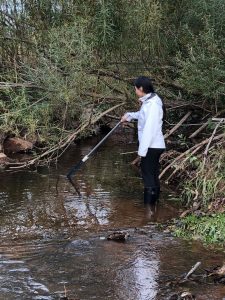
As part of a course at Dalhousie University, Jingyu measured water properties (temperature, water speed, etc) in a river to determine the impact of these factors on the fish population.
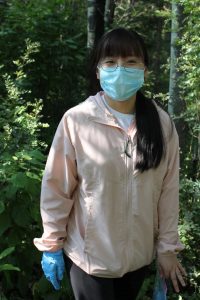
Jingyu taking soil samples in the Breton Plots, long term experimental agricultural plots at the University of Alberta.
Why do you do this work? Have you always wanted to work in land reclamation or the environmental field?
I spent my childhood in the village with my grandparents. I always enjoy observing everything in nature. After moving to the city, I watched a lot of news and more and more voices discussing the increasing environmental problems in my country and worldwide. All these factors led me to choose agricultural resources and environmental science as my major in university.
As to why I'm interested in the current study, I think it was probably influenced by a professor I met in my undergraduate program, Dr. Claude Caldwell. He said, "Agriculture is the science, art, politics, and sociology of changing sunlight into healthy, happy people." It made me realize that maybe what I learned could help others to be healthy and happy. Agriculture is closely related to both human life and the natural environment. We hope that agriculture can feed billions of people worldwide, and everyone can live a healthy and adequate life. We also hope that humans can reduce pollution from agriculture in the natural environment. Therefore, we need to work hard to find a better balance between the two goals.
What have been your most exciting or interesting results so far?
Preliminary analysis shows that different crop rotations, rather than fertilizers or the interaction of the two treatments, lead to significant long term effects for most basic soil indicators. Compared to the wheat - fallow rotation which is the control group (traditional farmland without any management), crop rotations that involve more than one crop or plant usually improve soil quality. The continuous grain rotation also has better soil quality than the control group, which is interesting.
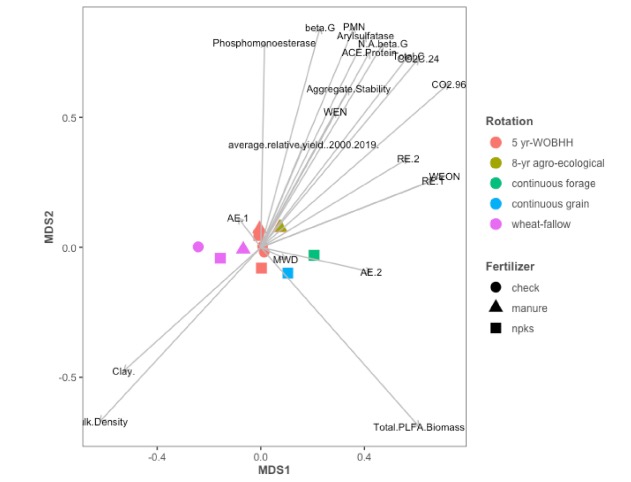
Non Metric Dimensional Scaling (NMDS) analysis of my research showing that crop rotation had a greater impact than fertilizer or the interaction. You can see this in the separation of the coloured shapes with each colour representing a different crop rotation treatment. The direction and length of the arrows on the graph indicate the direction of influence and strength of the influence.
What is your favourite part of your work?
Discovery and communication are my favorite parts. Many things are happening in the world. It can only exist in your world when you see it, observe it, and think about it. Most of the time, one's mind is limited. When I communicate with my supervisors and friends, they can always give me different perspectives to think about my problems in my research, which is very interesting and helpful. After thinking about it, I may discover something I did not notice before, which excites me.
What comes next?
I think a deeper analysis is needed for my research to understand the reasons behind the preliminary analysis. If possible, we can carry out the research that combines multiple regions with long term agricultural management, which may have more exciting findings.
After the research, I want to find work in the environmental field where I can use my experiences in agricultural management to guide land reclamation. For example, I want to explore how land remediation and reclamation practices should be combined with local specific conditions to improve success. At the same time, I have some interest in data analysis and programming. Nowadays, programming and software technology is increasingly applied by various disciplines. Such a combination may advance our research further.
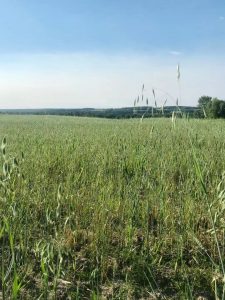
The Breton Plots

Jingyu
2021-2030 is the UN Decade for Ecological Restoration, what is the greatest challenge in your opinion to achieving its global goals?
The UN Decade for Ecological Restoration aims to prevent, halt and reverse the loss of ecosystems worldwide, of which saving soil from degradation is the most important. I think climate change may be the greatest challenge to achieving its global goals. For some degraded lands, such as arid land, climate change means higher temperatures, less precipitation, more evaporation, more dust storms and so on. For land reclamation, the difficulties in such areas are also greater. For example, vegetation is usually planted to aid in ecological restoration, but the harsher climate challenges plant growth.
Reducing carbon emissions is a critical point in mitigating climate change. It means temporary slowdowns in the economy, such as limiting emissions from factories and restricting car use at the same time. The practical implementation of these measures may be affordable for developed countries or developing countries with better economies. However, it may be beyond the economic capacity for most developing and underdeveloped countries. Additionally, it isn't easy to mitigate global climate change with only local improvements.
Anything else you would like to share?
I really enjoy being in nature - to feel the fresh air, which smells like a mixture of plants and soils. Land reclamation is something that makes a lot of sense. It's more like implementing a practical approach to "cure" the soil. I hope more people notice this area of work and even take some actions.

